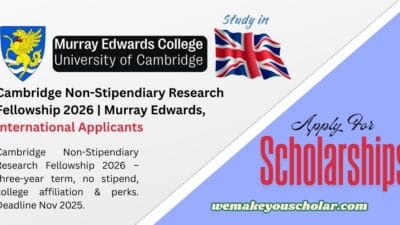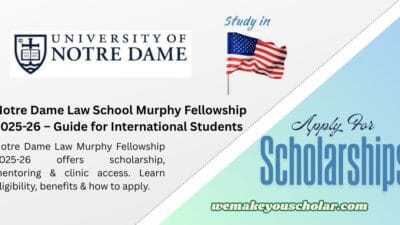ESRC WGSSS Education Pathway PhD Scholarship for International Students
The ESRC Welsh Graduate School for Social Sciences (WGSSS) is offering a fully funded PhD scholarship in the Education Pathway, open to international students. This is a competitive research opportunity to work on education-related topics within a dynamic social sciences environment in Wales, UK.
The scholarship is supported by the Economic and Social Research Council (ESRC), which is the UK’s primary funder of social science research. This studentship typically covers tuition fees, living stipend, research costs, and sometimes travel or conferences, making it one of the most attractive PhD funding routes for students outside the UK who wish to undertake high-quality doctoral research in education.
Key Features & What’s Funded
While exact details may vary each year, ESRC/WGSSS PhD scholarships generally include:
- Full UK PhD tuition fees (often the “home” rate, so international students are eligible under the studentship scheme).
- A generous annual stipend to cover living costs (often at ESRC’s standard rates, e.g. around £18,000–£22,000 per annum in recent years, though this varies by institution and year).
- Research support, including funding for fieldwork, data collection, travel, conferences, and consumables.
- Possibly additional allowances for equipment, training, or publication costs.
- Access to training programmes, workshops, and supervisory support through WGSSS network.
This package is intended to let you focus fully on your research without financial burden.
Eligibility Criteria (International Applicants)
To be eligible, international students generally need to satisfy most or all of the following criteria (subject to variation by year or host university):
- A strong master’s degree (or equivalent) in a relevant field (education, social sciences, policy, etc.).
- Academic excellence: high grades, relevant research experience or publications are advantageous.
- A convincing research proposal aligning with the Education Pathway themes under WGSSS (such as educational equity, policy, pedagogy, etc.).
- English language proficiency (e.g. IELTS, TOEFL) to meet UK university requirements.
- Willingness to be based in Wales (or UK) for the duration of the PhD and participate in WGSSS training and events.
Research Themes & Project Areas
The Education Pathway within WGSSS typically invites proposals that address pressing issues in education, for example:
- Educational inequality, inclusion, and access
- Policy evaluation in education systems
- Teacher professional development and training
- Curriculum innovation, pedagogy, digital learning
- Comparative education and global education studies
Your proposed project should clearly situate itself in social science methods and theory, and align with the ethos of the WGSSS network, which values methodological rigour, interdisciplinarity, and social impact.
Application Process: Steps You Must Take
The application process is competitive, so follow these steps to maximize your chances:
- Identify the hosting university or department participating in WGSSS who offer the Education Pathway. Usually several Welsh universities are partners.
- Contact potential supervisors whose research interests match yours and discuss your proposal idea.
- Prepare your full application, including your academic transcript, master’s degree certificate, CV, personal statement, and research proposal.
- Submit application via the university’s PhD admissions or WGSSS portal by the published deadline (often late in the academic cycle, e.g. around December–February). Check the relevant university’s site for exact date.
- Interview may be required — shortlisted applicants may be invited to present their project virtually or in person.
- Selection decisions are made by the WGSSS selection panel in conjunction with host university faculty and ESRC guidelines.
Selection Criteria & What They Look For
In assessing applications, the selection panel typically considers:
- Academic record and potential — transcripts, prior research, publications, or relevant experience.
- Quality of research proposal — originality, clarity, methodology, feasibility, and alignment with Education Pathway.
- Fit with WGSSS network — how your project complements existing themes, your engagement potential, and capacity to benefit from the training network.
- References — strong endorsements from academic referees, especially about research potential and independence.
- Benefit and impact — how your work may contribute to educational policy, practice, or scholarship.
Funding Duration, Conditions & Milestones
Typically, these scholarships run for 3 to 4 years, with conditions like:
- Annual review of progress to renew funding into subsequent years.
- Completion of required training modules or workshops via WGSSS.
- Reporting, publications, or conference participation as part of expected output.
Support and Training through WGSSS
As a WGSSS scholar, you’ll receive more than funding:
- Access to methodological training workshops, seminars, and summer schools.
- Networking with other PhD students, researchers, and policy-makers in the social sciences.
- Opportunities to attend conferences, present work, and receive peer feedback.
International Student Benefits & Considerations
Because you’re international, here are key advantages and things to verify:
- Many ESRC studentships allow “studentship status” for international students, which pays the international tuition rate.
- Funding usually covers visa-related expenses and may include relocation allowances.
- You must meet the UK immigration, English language, and residency conditions throughout your PhD.
Common Pitfalls & How to Avoid Them
- Submitting a weak or vague proposal — your research plan must be well thought-out and feasible.
- Missing the deadline — always check the relevant university’s date (falls in the academic cycle).
- Ignoring existing research in your field — show awareness of literature and gaps.
- Poor reference letters — choose referees who know your academic potential well.
- Failing to contact supervisors — proactive communication can help refine proposal and show initiative.
Tips for Strengthening Your Application
- Start early—draft your proposal, refine it, and get feedback.
- Engage with the literature and show gap analysis in your proposal.
- Outline clear methodology and realistic timelines.
- Show your awareness of policy/practice implications of your work.
- Tailor your application to Wales/UK educational context where relevant.
FAQs for International Applicants
Can international students apply?
Yes — WGSSS ESRC studentships often accept international applicants, provided you meet the academic and English language requirements.
Will the scholarship pay international tuition rates?
Many ESRC studentships can cover the international tuition fee if designated “studentship” status is extended to you. Always check the specific call.
What is the stipend amount?
The stipend varies by institution and year, but is typically aligned with UK ESRC rates. Confirm the current rate in the call.
Is there a separate application for ESRC/WGSSS?
Yes, besides the university’s PhD application, you usually need to submit additional materials to the WGSSS/ESRC selection panel.
When will funding decisions be announced?
Decisions often follow the university’s admission rounds. You may be informed several months after the application deadline.
Official Link & Further Information
For full details, eligibility, and how to apply, please see the official job posting and university site (where the call is hosted). You can start here:
ESRC WGSSS Education Pathway PhD Scholarship




